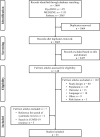Factors affecting mental health of health care workers during coronavirus disease outbreaks (SARS, MERS & COVID-19): A rapid systematic review
- PMID: 33320910
- PMCID: PMC7737991
- DOI: 10.1371/journal.pone.0244052
Factors affecting mental health of health care workers during coronavirus disease outbreaks (SARS, MERS & COVID-19): A rapid systematic review
Abstract
Introduction: The novel Coronavirus Disease (COVID-19) outbreak currently puts health care workers at high risk of both physical and mental health problems. This study aimed to identify the risk and protective factors for mental health outcomes in health care workers during coronavirus epidemics.
Methods: A rapid systematic review was performed in three databases (March 24, 2020) and a current COVID-19 resource (May 28, 2020). Following study selection, study characteristics and effect measures were tabulated, and data were synthesized by using vote counting. Meta-analysis was not possible because of high variation in risk factors, outcomes and effect measures. Risk of bias of each study was assessed and the certainty of evidence was appraised according to the GRADE methodology.
Results: Out of 2605 references, 33 observational studies were selected and the identified risk and protective factors were categorized in ten thematic categories. Most of these studies (n = 23) were performed during the SARS outbreak, seven during the current COVID-19 pandemic and three during the MERS outbreak. The level of disease exposure and health fear were significantly associated with worse mental health outcomes. There was evidence that clear communication and support from the organization, social support and personal sense of control are protective factors. The evidence was of very low certainty, because of risk of bias and imprecision.
Conclusion: Safeguarding mental health of health care workers during infectious disease outbreaks should not be treated as a separate mental health intervention strategy, but could benefit from a protective approach. This study suggests that embedding mental health support in a safe and efficient working environment which promotes collegial social support and personal sense of control could help to maximize resilience of health care workers. Low quality cross-sectional studies currently provide the best possible evidence, and further research is warranted to confirm causality.
Conflict of interest statement
I have read the journal's policy and the authors of this manuscript have the following competing interests: the activities of the Belgian Red Cross include the provision of psychosocial first aid to laypeople. This does not alter our adherence to PLOS ONE policies on sharing data and materials.
Figures
References
Publication types
MeSH terms
LinkOut - more resources
Full Text Sources
Medical
Miscellaneous



